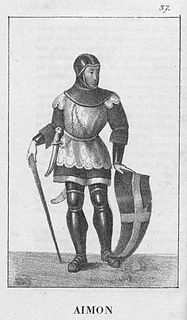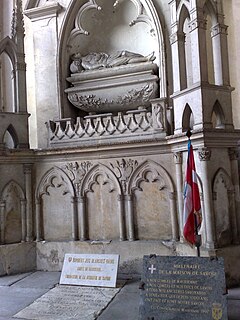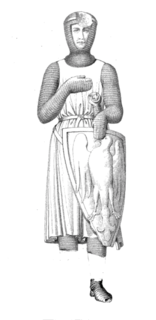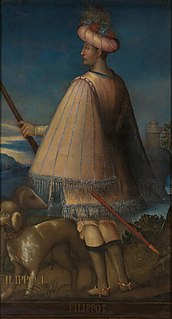 W
WAmadeus II was the Count of Savoy from 1078 to 1080. His life is obscure and few documents mention him. During his reign he was overshadowed by his mother, but he had good relations with the Papacy and, for a time, the Holy Roman Emperor.
 W
WAmadeus III of Savoy was Count of Savoy and Maurienne from 1103 until his death. He was also known as a crusader.
 W
WAmadeus IV was Count of Savoy from 1233 to 1253.
 W
WAmadeus V, surnamed the Great for his wisdom and success as a ruler, was the Count of Savoy from 1285 to 1323. He established Chambéry as his seat. He was the son of Thomas II of Savoy and Beatrice Fieschi.
 W
WAmadeus VI, nicknamed the Green Count was Count of Savoy from 1343 to 1383. He was the eldest son of Aymon, Count of Savoy, and Yolande Palaeologina of Montferrat. Though he started under a regency, he showed himself to be a forceful leader, continuing Savoy's emergence as a power in Europe politically and militarily. He participated in a crusade against the Turks who were moving into Europe.
 W
WAmadeus VII, known as the Red Count, was count of Savoy from 1383 to 1391.
 W
WAmadeus VIII was a Savoyard nobleman, the son of Amadeus VII, Count of Savoy and Bonne of Berry. He was surnamed the Peaceful. After the death of his father in 1391, his mother acted as a regent, because of his youth. He was a claimant to the papacy from 1439 to 1449 as Felix V in opposition to Eugene IV and Nicholas V, and is considered the last historical antipope.
 W
WAymon, nicknamed the Peaceful, was Count of Savoy from 1329 to 1343.
 W
WBoniface (1245–1263) was Count of Savoy from 1253 to 1263, succeeding his father Amadeus IV. He never married and thus left no heir.
 W
WEdward (1284–1329), surnamed the Liberal, was the Count of Savoy from 1323 to 1329. He was the son of Amadeus V, Count of Savoy, and his first wife Sybille of Bâgé.
 W
WHumbert I, better known as Humbert the White-Handed or Humbert Whitehand was the founder of the House of Savoy. Of obscure origins, his service to the German emperors Henry II and Conrad II was rewarded with the counties of Maurienne and Aosta and lands in Valais, all at the expense of local bishops and archbishops; the territory came to be known as the county of Savoy.
 W
WOtto was count of Savoy from around 1051 until his death. Through marriage to Adelaide, the heiress of Ulric Manfred II, he also administered the march of Susa from around 1046 until his death.
 W
WPeter II, called the Little Charlemagne, held the Honour of Richmond, Yorkshire from April 1240 until his death and was Count of Savoy from 1263 until his death. He built the Savoy Palace in London.
 W
WPeter I was count of Savoy and margrave of Turin jointly with his brother Amadeus II of Savoy from c. 1060 to 1078. He ruled only nominally, as true power was in the hands of his mother, Adelaide of Susa.
 W
WPhilip I was the Count of Savoy from 1268 to 1285. Before this, he was the Bishop of Valence (1241–1267), Dean of Vienne, Isère (1241–1267) and Archbishop of Lyon (1245–1267).
 W
WThomas Ι was Count of Savoy from 1189 to 1233. He is sometimes numbered "Thomas I" to distinguish him from his son of the same name, who governed Savoy but was not count.
 W
WUmberto II, nicknamed the Fat, was Count of Savoy from 1080 until his death in 1103. He was the son of Amadeus II of Savoy.
 W
WHumbert III, surnamed the Blessed, was Count of Savoy from 1148 to 1188. His parents were Amadeus III of Savoy and Mathilde d'Albon the daughter of Guigues III of Albon. He ceded rights and benefits to monasteries and played a decisive role in the organization of Hautecombe Abbey. It is said that he would rather have been monk than a sovereign. On the death of his third wife he retired to Hautecombe, but then changed his mind and, by his fourth wife finally had son, Thomas. He sided with the Guelph party of Pope Alexander III against the Ghibelline Emperor Frederick Barbarossa. The result was an invasion of his states twice: in 1174 Susa was set on fire, and in 1187 Henry VI banished him from the Holy Roman Empire and wrested away most of his domains, of which he was left only with the valleys of Susa and Aosta. He died at Chambéry in 1189. He was the first prince buried at Hautecombe. His memorial day is March 4.